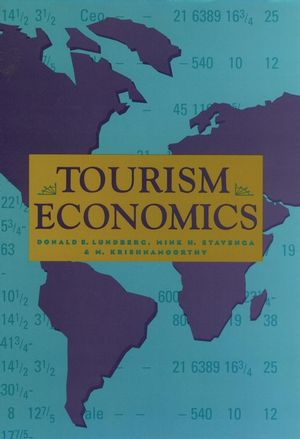|
Textbook
Tourism EconomicsISBN: 978-0-471-57884-0
Hardcover
208 pages
February 1995, ©1995
 This is a Print-on-Demand title. It will be printed specifically to fill your order. Please allow an additional 10-15 days delivery time. The book is not returnable.
|
||||||
A knowledge of economic trends and conditions is fundamental to strategic planning and project development in any business. Yet, despite the fact that tourism has become the world's largest industry, until now, there were no textbooks devoted to the economics of tourism. A book whose time has finally come, Tourism Economics arms students and industry professionals with a solid working knowledge of economic concepts and analytical techniques as they apply to tourism. Written by three experts from the U.S. International University's prestigious Department of Hotel, Restaurant, and Tourism Management, Tourism Economics:
- Explains all important economic principles and concepts, defines key terminology, and clearly describes a number of analytical models and forecasting techniques
- Illustrates all points covered with numerous case studies from around the world and selected reading excerpts
- Requires no prior familiarity with economics and features a clear, easy-to-read, nonmathematical style
"Tourism can be viewed as an institution with millions of interactions taking place, an institution with a history, body of knowledge, and a constituency of millions of people who feel themselves a part of the institution. For purposes of this book, tourism is an economic activity involving billions of dollars exchanged each month, a social science to be analyzed, trends to be identified, and costs/benefits to be computed."—from Tourism Economics
The past two decades have been a time of fast and furious growth for world tourism, accounting for more than 6% of the world's gross national product ($3.2 trillion in 1993) and employing 127 million people worldwide, tourism is now, beyond a doubt, the world's largest industry. And with an average of 20,000 new jobs created per each additional $1 million spent on travel, tourism is also the most prolific generator of new jobs. As a consequence of tourism's growing preeminence, a new field has emerged over the past few years to help the tourism industry and public policymakers better understand the impact of tourism on other segments of the economy and to recognize and facilitate current and future economic trends in tourism—tourism economics.
This groundbreaking book was written by three experts from the U.S. International University's prestigious Department of Hotel, Restaurant, and Tourism Management. With the assistance of numerous case studies from around the world and selected reading excerpts, they explain all relevant economic principles and concepts, define key terminology, and clearly describe a number of useful analytical models and forecasting techniques. Requiring no prior knowledge of economics, Tourism Economics features a clear, easy-to-read, nonmathematical style.
A book whose time has finally come, Tourism Economics is indispensable reading for students of tourism and hospitality as well as industry professionals and researchers.



